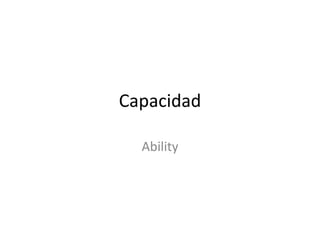
Habilidad can
- 2. ¿Cuándo usar can, be able to, can’t, could, couldn’t? Can y could tienen diversos usos, fundamentalmente para: • Hablar de habilidad, capacidad o conocimiento. Lions can run very fast. Los leones pueden correr muy rápido. Mary could swim when she was 3. Mary sabía/podía nadar a los 3 años. • Para peticiones y para dar permiso: Can I borrow your pen? ¿Puedo usar tu bolígrafo? You can leave now. Puedes marcharte ahora. • Para sugerencias: You can do the problem later. Puedes hacer el problema más tarde.
- 3. Could • Para hacer peticiones formales: Could you do me a favour? ¿Podría hacerme un favor? • Para expresar una posibilidad más remota. We could visit Paris next year. Podríamos visitar Paris el año que viene.
- 4. Can’t (forma negativa de can) • Indica prohibición y deducción negativa: You can’t park here. No puedes aparcar aquí. That can’t be true. Eso no puede ser verdad.
- 5. Be able to • Se utiliza en los tiempos que no tiene can. They haven’t been able to go. No han podido venir. You won’t be able to come. No podrás venir. Will we be able to go this Sunday? ¿Podremos ir este domingo?
- 6. Los verbos modales, nunca llevan to: You can to go home now. They can’t to park here. We could to visit Paris next year.